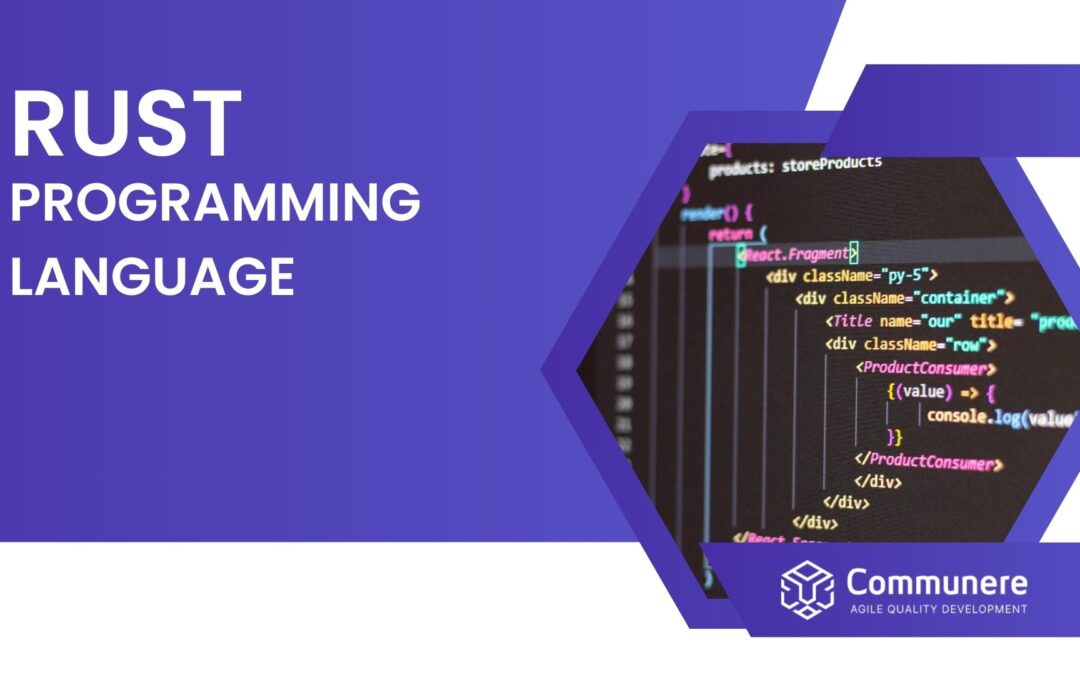Table of Contents
What is Rust Programming Language?
Established in 2006 by the software company Mozilla, Rust is a systems programming language that is largely used for memory management, safety, and performance. Programmers have praised Rust for its emphasis on memory safety, an aspect that makes it all the more attractive to businesses that value data security.
As a modern alternative to languages like C and C++, Rust is becoming the language of choice for developers who appreciate scalability and concurrency. The Stack Overflow Developer Survey from 2022 found that Rust is the most beloved programming language, a testament to its growing popularity.
Hailed as an exciting and evolving language, Rust gives developers the ability to create modern software with the potential to outcompete other more widely used languages. Here are the key benefits of Rust programming language:
Why Rust?
Rust delivers several key benefits for infrastructure and DevOps:
- Memory Safety — Rust has a strict ownership model and borrow checker that ensures memory safety and thread safety at compile time. This means Rust programs are free of entire classes of bugs like buffer overflows, use-after-frees, and data races.
- Fast and Efficient — Rust compiles to native code and has zero-cost abstractions. This means Rust programs have performance comparable to C and C++ without the huge class of undefined behaviours.
- Fearless Concurrency — Rust’s ownership model enables concurrency without data races. This allows you to easily leverage threads and async I/O for maximum performance.
- Great Tooling — Rust has a fantastic compiler with detailed error messages and a package manager (Cargo) that makes dependencies and builds a breeze.
- Strong Static Types — Rust is a statically typed language, meaning types are checked at compile time. This catches entire classes of bugs early and leads to fewer runtime errors.
- Widely Used — Rust is used by major tech companies like Mozilla, Dropbox, Cloudflare, and more for systems programming and infrastructure needs. The ecosystem has many crates (libraries) for infrastructure and DevOps tasks.
What Is Rust Programming Language Used For?
Rust is a programming language designed for system-level programming with an emphasis on safety and performance. It’s also known for its memory safety features without sacrificing low-level control over system resources. Here are some common use cases for Rust
System Programming:
Rust is often used for developing operating systems, file systems, and other low-level software where performance and control over system resources are crucial. Its focus on memory safety, zero-cost abstractions, and low-level control makes it suitable for such tasks.
Web Development:
Rust is increasingly being used for web development, particularly for building high-performance web servers and other server-side applications. Frameworks like Actix and Rocket are popular in the Rust ecosystem for developing web applications.
Game Development:
Rust’s emphasis on performance and control over system resources makes it well-suited for game development. Some game engines and libraries, such as Amethyst, are built with Rust.
Embedded Systems:
Rust’s control over system resources and low-level programming features make it suitable for embedded systems development. It is used in projects ranging from small microcontrollers to more complex embedded systems.
Networking and Concurrent Programming:
Rust provides features that make it easy to write concurrent and parallel code, making it suitable for networking applications and other scenarios where high concurrency is required. The ownership system helps prevent common concurrency bugs like data races.
Command-Line Tools:
Rust is often chosen for building command-line tools and utilities due to its performance, safety guarantees, and ease of use. Tools like ripgrep and exa are examples of Rust-based command-line utilities.
Blockchain and Cryptocurrency:
Some projects in the blockchain and cryptocurrency space use Rust due to its focus on performance and safety. For example, the Parity Ethereum client is implemented in Rust.
Cross-Platform Development:
Rust’s ability to generate small, efficient binaries and its support for multiple platforms make it suitable for cross-platform development.
Which Companies Use Rust?
Rust is not only popular among developers (as seen in the StackOverFlow developers survey) but also among companies. The top companies using Rust in production are:
The first programming language Facebook used when creating its source control backend was Python, and this has since been rewritten in Rust. Given the amount of sensitive data Facebook (now Meta) handles, their tech team were on the lookout for a programming language with strong safety features, and that’s what drew them to Rust. The social media giant first used Rust back in 2016, and by 2019, they were employing over 100 Rust developers. Facebook is committed to the development of Rust, so much so that they are members of the Rust Foundation, a non-profit organisation committed to championing and promoting the language.
Discord
Much like Facebook, Discord is a platform that requires a robust and secure programming language, hence why they have opted for Rust. Both the client and server sides of its codebase are written in Rust, and their software engineers decided to switch from Go to Rust for their Read States service. They were drawn to Rust’s speed and memory efficiency, advantages it is able to achieve due to not having runtime or a garbage collector.
Dropbox
Dropbox is a file hosting platform that offers cloud storage and file synchronisation services, and it relies on Rust programming language for core parts of its file-syncing system. Their software engineers found that Rust outcompeted other languages, such as Python, in numerous areas. They use Rust for vital components, including block storage and load balancing, elements that its services rely on.
Microsoft
Microsoft is a strong advocate of Rust programming language, and they use it for their Windows operating system. Not only have they released a Rust for Windows program, but they are also founding members of the Rust Foundation. Their commitment to Rust is due to the language’s emphasis on memory safety. They found that 70% of security patches are caused by memory-related bugs and believe that Rust would have been capable of detecting these issues during the development stage. Microsoft’s engineers are in the process of creating a standard Windows library for Rust, and one of their goals is to develop their own programming language inspired by Rust’s features.
Amazon
Amazon is a technology company that has taken the world by storm, selling electronics, homeware, music, and all manner of other goods. Amazon Web Services is an IT service management company and a subsidiary of Amazon that uses Rust to maintain its speedy and secure software. As a testament to how much Amazon values Rust, they released Firecracker, their first Rust-based product, back in 2018. As one of the earliest advocates for the language, Amazon Web Services is particularly impressed by its excellent memory safety and how it can resolve memory-related faults common in other languages, such as C and C++.
Concurrency in Rust
Rust handles these questions in a unique way, so developers avoid the typical choice between high-level and low-level languages.
High-level languages often choose one approach, requiring trade-offs to provide a single abstraction, which will be more performant in some instances than in others. On the other hand, low-level languages often lack abstractions, aiming to provide the flexibility to create optimal solutions for different projects, requiring much more work upfront.
Instead, Rust has different concurrency abstractions for various use cases, which provides the ability to maximize performance and minimize errors more robustly.
use std::thread;
use std::time::Duration;
fn main() {
thread::spawn(|| {
for i in 1..5 {
// print i, then sleep thread for 2 milliseconds
println!("Secondary Thread Prints {}", i);
thread::sleep(Duration::from_millis(2));
}
});
for i in 1..5 {
// print i, then sleep thread for 2 milliseconds
println!("Main Thread Prints {}", i);
thread::sleep(Duration::from_millis(1));
}
}




![Why Custom Web Development is the Best Approach [2024]](https://resources.communere.com/wp-content/uploads/2024/02/Why-Custom-Web-Development-is-the-Best-Approach-1024x570.jpg)

